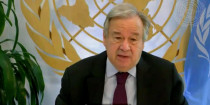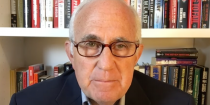Maurizio Abbate – Mr. Abbate is Chairman of ENAC, National Institute for Cultural Activities, Italy
Dear friends and colleagues from around the world,
We are gathered here today to seek, with all our strength, useful ideas and solutions to resolve the terrible armed conflict that has been raging in the old continent for almost a year-and-a-half. A fratricidal war capable of bringing death and destruction among the civilians in the territories directly involved and a very serious economic and financial crisis in the rest of the world, due to a system of speculation implemented with unprecedented wickedness by the food and energy multinationals. Corporations often controlled by the same masters.
We are well aware that giants such as Vanguard and BlackRock share a majority of the shares of agribusiness multinationals through Monsanto, Cargill and Dupont. The same hold today in Ukraine about 19 million hectares of land devoted to intensive agriculture, which corresponds to 60 percent of Ukrainian agricultural land. Similarly, 100 percent of Ukrainian mines are now owned by multinationals. To ask why war broke out in this part of Europe, starting from those simple figures, therefore seems superfluous.
The important thing, therefore, is not to analyze the causes of the conflict, but rather to try to understand how was it possible that the American public, as well as the European public, always attentive to the problem of peace, thanks to their peace movements, are today almost numbed by what is happening.
War is peace. Freedom is slavery. Ignorance is strength. These were the slogans engraved on the facade of the Ministry of Truth described in George Orwell’s famous novel. This year, the European Union, in an almost grotesque way, has created a Peace Instrument to allocate nearly €8 billion for the purchase of weapons. Buying weapons to prevent conflict and build peace—this is stated, prominently, on the European council’s website. Almost a parallel to the Orwellian Ministry of Truth.
If an institution such as the European Union can alter the foundations of freedoms, that is, the truth, by characterizing the supply of weapons, tools for killing, as useful tools for building peace, then the cultural and moral degradation of the institutions, as well as that of the media that should be exposing such lies, has become self-evident.
Unfortunately, what I have previously stated about the concentration of food and energy production in the hands of a few powerholders is also true for political institutions, the media, as well as those in charge of education. Culture, which, emulating the teachings of Socrates and Plato, should be concerned with developing thoughts and indicating the models of society to be built in order to achieve nobler goals, such as general welfare and solidarity among peoples, is constantly downgraded to a kind of unimportant fashion. Such principles, at the same time, are subordinated to the interests of a few economic powers who have made contemporary society a huge market of precariousness in which everything can be sold or bought. Even the right to life.
A society in which social cohesion is being progressively demolished and upon which continuous alleged emergencies are being imposed, such as climate, health and finance, capable of altering national choices in agriculture, crafts, industry and society.
Therefore, the time has come to stop this neo-barbaric drift caused by the globalization of economy and culture.
A new social and cultural Renaissance must be initiated. To do so, a new paradigm is urgently needed for our Western communities, which must definitively abandon the principle of business as the centerpiece of society and put man with his material and spiritual complexity back at its center. Politics must redefine a harmonious system in which every man and woman has his or her own role in a synergistic and organic way. A society in which human beings must be judged and valued for who they are, for the values they express and succeed in embodying, rather than for what they possess. Only in this way can individual nations, free, independent, self-determined and with their own specificities, become communities again and contribute to the global growth of all humanity.
The differences and peculiarities of peoples, generated by centuries of history and different cultures, must become the driving force to build a constructive dialogue for peaceful coexistence. A dialogue that leads to an equitable distribution of the resources of the planet on which we all live and which are often the cause of armed clashes and unprecedented violence due to the criminal desire to concentrate them in the hands of a few.
As we develop this thesis and try to involve all those who share its aims, however, strong and persuasive signals must be sent out. It is imperative to make it clear to the world that so many free people, not only have no intention of bowing to the deliberate decisions autocratically made by globalist elites, but are ready for a global change of the paradigm imposed until now by those who believe themselves to be the absolute masters.
Confronted with the holders of the major global media in a now imminent head-on clash, networking is needed. It is necessary to organize as many events as possible and use every single television, computer or radio channel to spread the news. Inviting foreign guests to local events must also become a habit capable of disrupting the mantra that only globalization can guarantee freedom, pluralism and democracy.
ENAC, the National Institute for Cultural Activities in Italy, which I am proud to represent, is organizing a conference in Italy with the aim of re-establishing relations between Syria and Italy. Economic and cultural relations that were interrupted for mere political interests and have not been reopened even in the aftermath of the dramatic earthquake that caused thousands of civilian casualties in Turkey and Syria.
At this conference, in which we would be happy to welcome any of those present today, who would like to participate, we intend to send a clear and unequivocal message: While liberalism talks about peace and democracy causing wars and building walls, we respond with the strength of culture, the only one capable of guaranteeing and respecting individual differences while working on building a bridge made of friendship, solidarity and cooperation among peoples.











